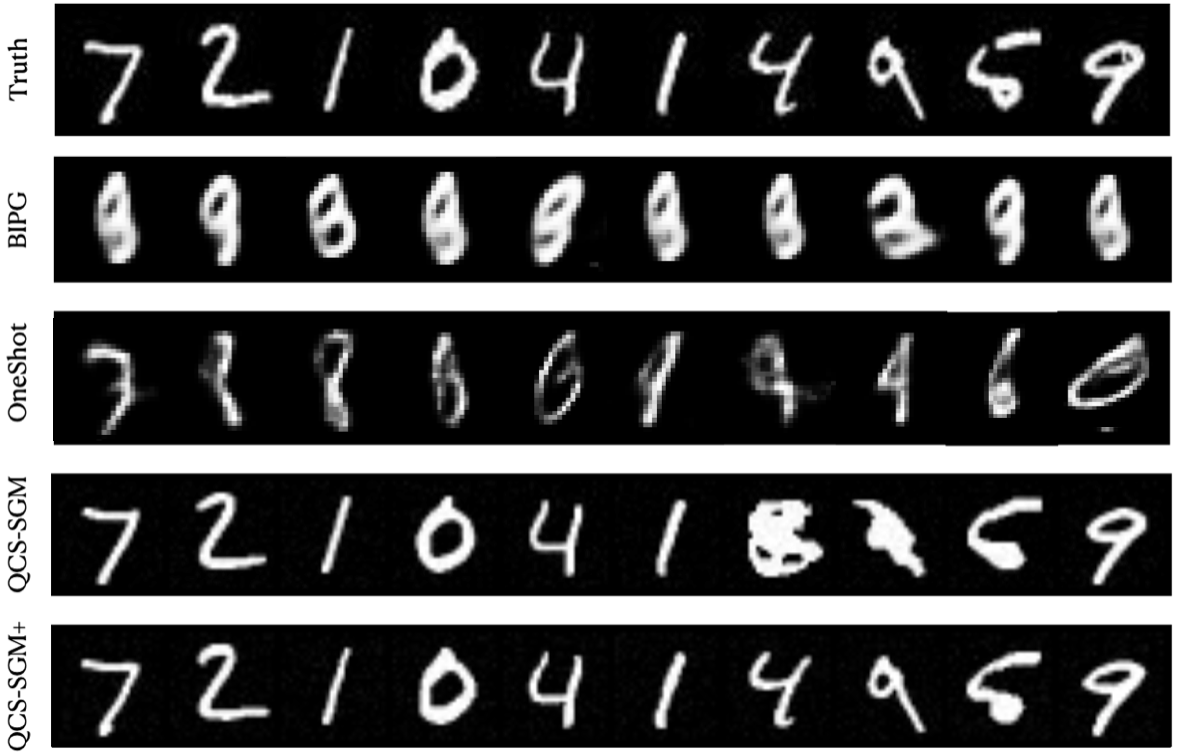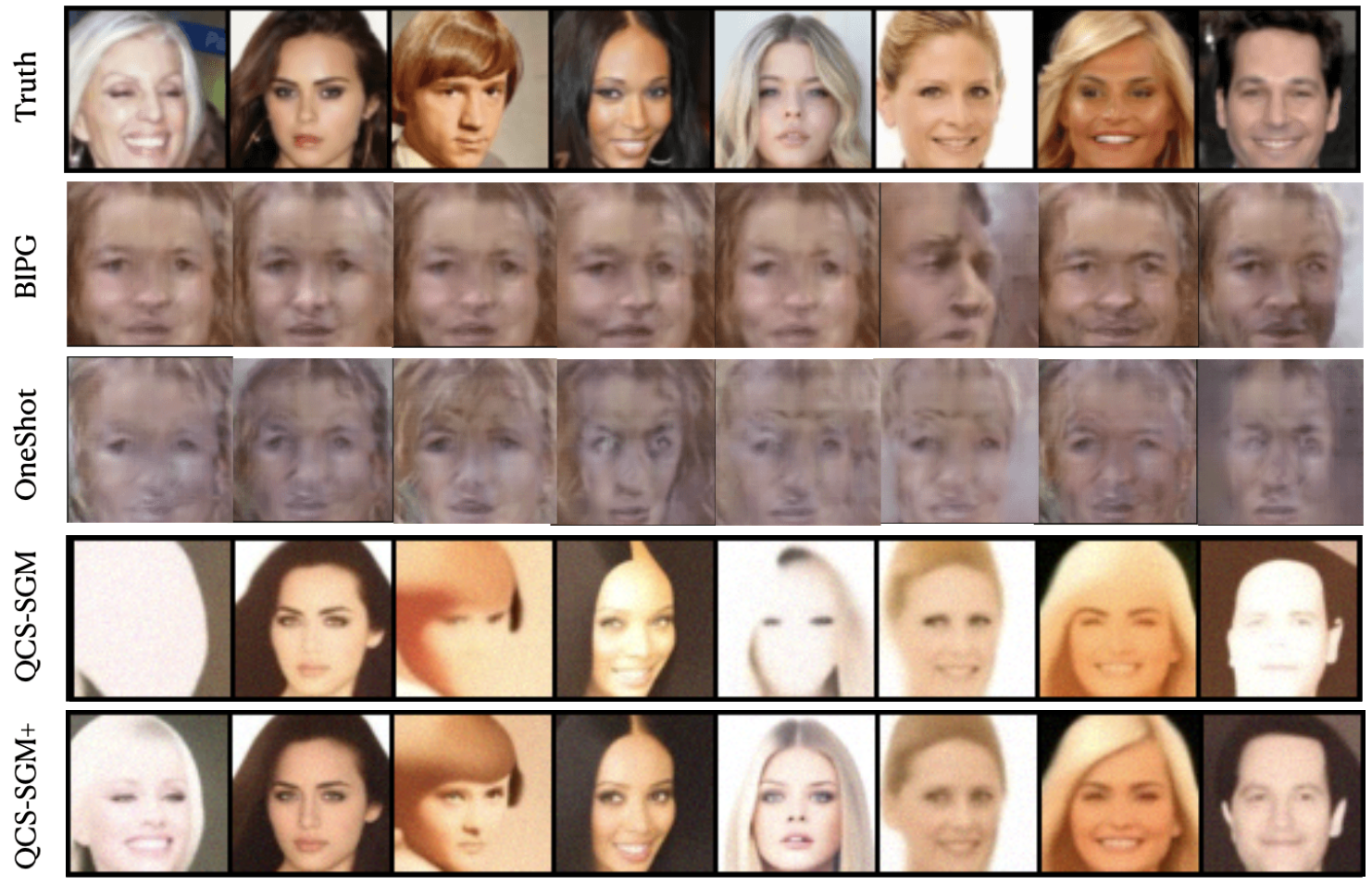This repo shows code of an advanced variant of QCS-SGM, namely QCS-SGM+.
QCS-SGM+: Improved Quantized Compressed Sensing with Score-Based Generative Models
A comparison of QCS-SGM+ with QCS-SGM and other algorithms on MNIST and CelebA datasets in the case of 1-bit CS for ill-conditioned sensing matrix A.
Create a new environment and run the following to install all necessary python packages for our code.
pip install -r requirements.txtmain.py` is the file that you should run for quantized CS. Execute python main.py --help to get its usage description:
usage: main.py [-h] --config CONFIG [--seed SEED] [--exp EXP] --model_dir DIR
[--comment COMMENT] [--verbose VERBOSE] [--test] [--sample]
[--fast_fid] [--resume_training] [-i IMAGE_FOLDER] [--ni]
optional arguments:
-h, --help show this help message and exit
--config CONFIG Path to the config file
--seed SEED Random seed
--exp EXP Path for saving running related data.
--model_dir DIR Path for putting the checkpoint file.
--comment COMMENT A string for experiment comment
--verbose VERBOSE Verbose level: info | debug | warning | critical
--test Whether to test the model
--sample Whether to produce samples from the model
--fast_fid Whether to do fast fid test
--resume_training Whether to resume training
-i IMAGE_FOLDER, --image_folder IMAGE_FOLDER
The folder name of samples (saved results)
--ni No interaction. Suitable for Slurm Job launcher
Configuration files are in config/. You don't need to include the prefix config/ when specifying --config . All files generated when running the code is under the directory specified by --exp. They are structured as:
<exp> # a folder named by the argument `--exp` given to main.py
├── datasets # all dataset files
├── logs # contains checkpoints and samples produced during training
│ └── <model_dir> # a folder named by the argument `--model_dir` specified to main.py
│ ├── checkpoint_x.pth # the checkpoint file saved at the x-th training iteration
├── saved_results # contains original/recovered images
│ └── DATA_Type # Name of datasets, e.g., MNIST, CIFAR10, CELEBA
│ └── 1-bit # recovered images from 1-bit CS
``` └── image_x.png # samples generated from checkpoint_x.pth
│ └── 2-bit # recovered images from 2-bit CS
``` └── image_x.png # samples generated from checkpoint_x.pth
│ └── 3-bit # recovered images from 3-bit CS
``` └── image_x.png # samples generated from checkpoint_x.pth
│ └── linear # recovered images from linear (un-quantized) CS
``` └── image_x.png # samples generated from checkpoint_x.pthTo reconstruct images from the Q-bit quantized noisy measurements using NCSNv2, one can run the code as follows: (Take CelebA dataset for an example)
Step 1:
Edit celeba_ill_1bit.yml in ./configs/ to specify the simulated setting, e.g.,
In the sampling group of **.yml
checkpoint id: ckpt_id
learning rate: step_lr
whether the CS problem is considered: linear_inverse (True or False, set true for CS)
True: perform conditional sampling based on observations y
False: perform unconditional sampling
In the measurements group:
Number of measurements M : measure_size
additive noise variance sigma^2 : noise_variance
Whether or not quantization is used: quantization (True or False)
Number of quantization bits Q: quantize_bits
matrix: type of sensing matrix A (eg., 'correlated','ill-conditioned','Gaussian')
Step 2: Run the following command
python python main.py --config celeba.yml --model_dir celeba --i ./celeba_resultsReconstructed will be saved in <exp>/celeba_results/.
Please download the existing open-sourced pretrained checkpoints from the following link for MNIST, Cifar10, CelebA, and put them in the
./exp/logs/mnist, ./exp/logs/cifar10, ./exp/logs/celeba, respectively (Or, you can simply download the whole exp.zip file, unzip it in the root folder of this project). Please select the pre-trained models with the specified ckpt_id in the config files
MNIST Link: https://1drv.ms/u/s!AksoPUl-6AQRhOceyE4DTvfCTd7b3Q?e=zrJYoi
Link: https://drive.google.com/drive/folders/1217uhIvLg9ZrYNKOR3XTRFSurt4miQrd?usp=sharing
It assumes the --exp argument is set to exp
This repo is built on top of the open-sourced QCS-SGM code https://github.com/mengxiangming/QCS-SGM and ncsnv2 code: https://github.com/ermongroup/ncsnv2
@article{meng2022quantized,
title={Quantized Compressed Sensing with Score-Based Generative Models},
author={Meng, Xiangming and Kabashima, Yoshiyuki},
journal={arXiv preprint arXiv:2211.13006},
year={2022}
}
@inproceedings{song2020improved,
author = {Yang Song and Stefano Ermon},
editor = {Hugo Larochelle and
Marc'Aurelio Ranzato and
Raia Hadsell and
Maria{-}Florina Balcan and
Hsuan{-}Tien Lin},
title = {Improved Techniques for Training Score-Based Generative Models},
booktitle = {Advances in Neural Information Processing Systems 33: Annual Conference
on Neural Information Processing Systems 2020, NeurIPS 2020, December
6-12, 2020, virtual},
year = {2020}
}
